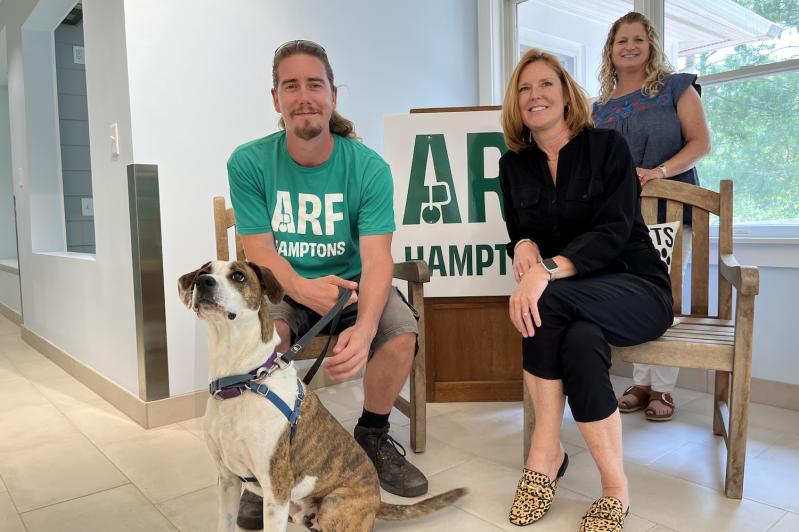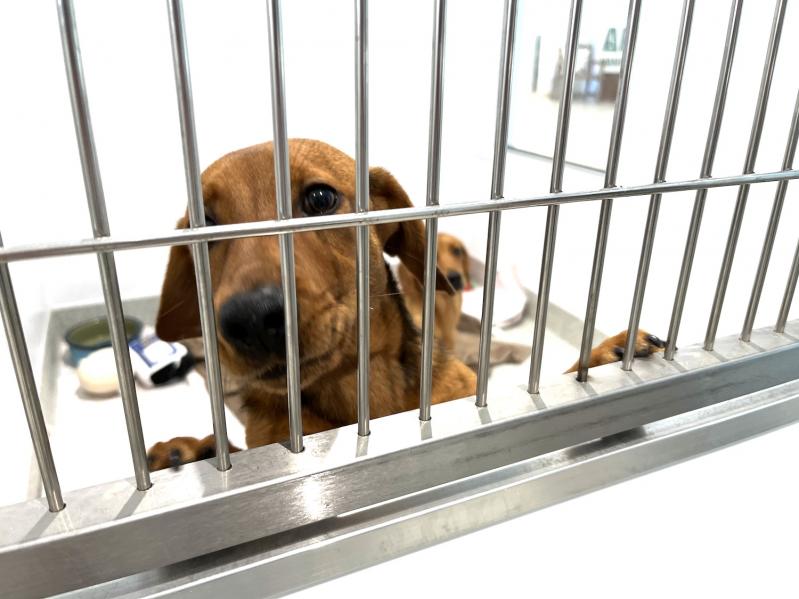From building a brand-new training facility to renovating its catteries and engineering new dog kennels, the Animal Rescue Fund of the Hamptons has created an oasis for rescued animals in its newly completed Forever Home, which officially reopened in Wainscott this spring after a 21-month renovation.
The revamped campus now includes an 8,600-square-foot training center and 7,000-square-foot kennel building designed “to meet the needs of the animals so that they can have the space where they’re comfortable while they’re with us and can learn to love human beings to then find their perfect match,” said Kimberly Nichols, ARF’s recently appointed executive director. ARF was founded in 1974 and has helped tens of thousands of dogs and cats since then, but “you can imagine the wear and tear on an animal shelter over the years, so it was time,” Ms. Nichols said during a recent tour of the updated ARF headquarters, a project that was in the works for 10 years.
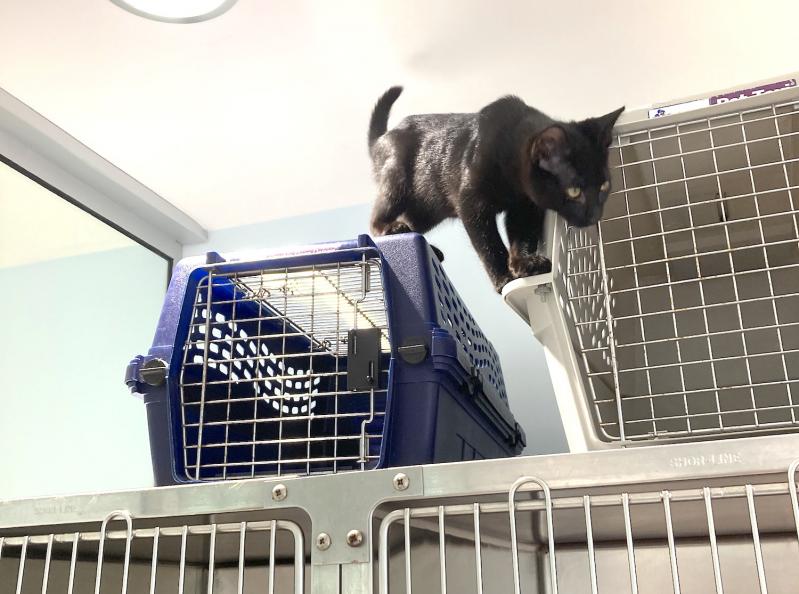
In the cat wing, where an average of three cats stay in each room, there are new additions like towers, mats, and catnip bubbles to keep the animals happy. Tiny kittens jumped around, playing hide-and-seek behind cages and climbing the wall installations while others rested. “The whole room is meant to inspire [the cats], even treat them, and keep them occupied,” Ms. Nichols said.
The kittens are all local, many from feral colonies. Often landscapers will find them and bring them to ARF, she said. ARF also has a free spay-andneuter program known as Operation Cat to help control the feral cat population. According to its website, volunteers give food, water, and shelter to over 1,000 cat colonies, helping to trap the cats and bring them to ARF where they get vaccinated and “fixed” before being released back to their colonies. In 26 years, ARF has helped over 35,000 feral cats from Montauk to Speonk.
Kitten season is in full swing at the moment, and one of the ways ARF is showcasing its rescues is through a new kitten yoga class, in which participants work on mindfulness with the help of furry companions. Niya Minardi participated in the yoga class and came back with her family to adopt Ash and Flame, domestic shorthair brothers with grayand-black stripes and white paws that were featured in the class. “Doing yoga with the kittens was very healing‚“ Ms. Minardi said, and when she found Ash, she “totally fell in love.”
The biggest improvement to the ARF campus is the new dog kennel, which is air-conditioned and heated. It has four quadrants, so that the animal care staff can come in without disrupting all of the dogs.
“It used to be one long corridor, so when you walked the whole thing it got very intense,” recalled Jamie Berger, ARF’s marketing and communications director. Now “our animal care team can go in through side doors . . . without disrupting everybody.” The system also allows for dogs with higher behavioral needs to be put into one quadrant.
Each cage has its own run to the outside. “They love the space and they love the freedom of inside and outside,” Ms. Nichols said. “Even in the heat of the middle of the day, they want to be outside, they want the option. So we leave the doors open for them.” At night, sometimes the trainers find the dogs all sleeping outside together or howling at the moon.
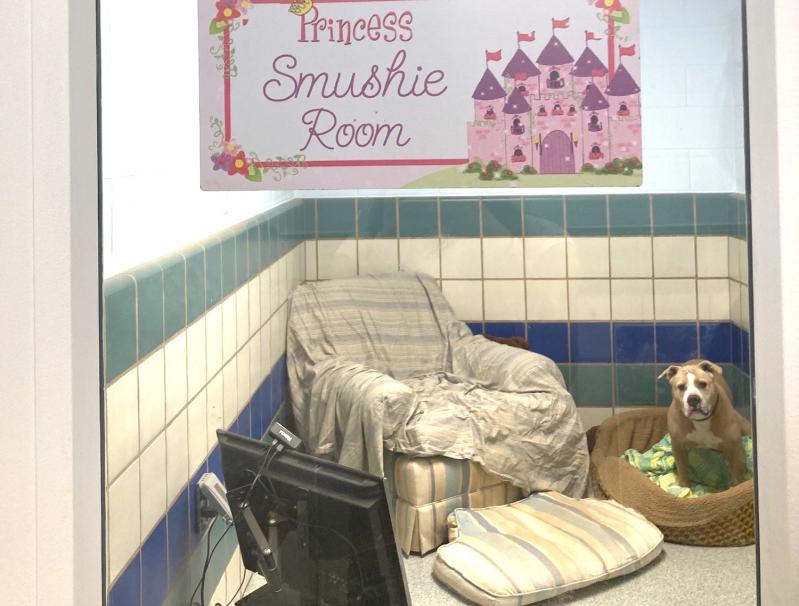
There are also four private suites for dogs that cannot be around other dogs and are used to being in a home. For example, Smushie has a chair and a TV in her suite because that is what she was comfortable with in her past home. In this way, ARF tries to accommodate animals’ individual needs.
“A lot of the things that needed to be improved to make the dogs more happy and less stressed have all been done with this renovation,” said Mike Hinz, a caretaker of the animals at ARF for the past 12 years. And the dogs are responding. “I have seen a really positive change with all of them,” he said.
“What makes ARF unique is that we only use positive reinforcement,” Ms. Nichols said. Although it takes repetition, “it works long term and helps behaviorally. We are encouraging everyone to use positive reinforcement.” Another thing that “is incredible about ARF is the interaction between other departments.” The cattery and the kennel “meet weekly for rounds and will discuss every single animal and the needs. It’s fun to watch because you think cats and dogs are different, but they start sharing ideas.”
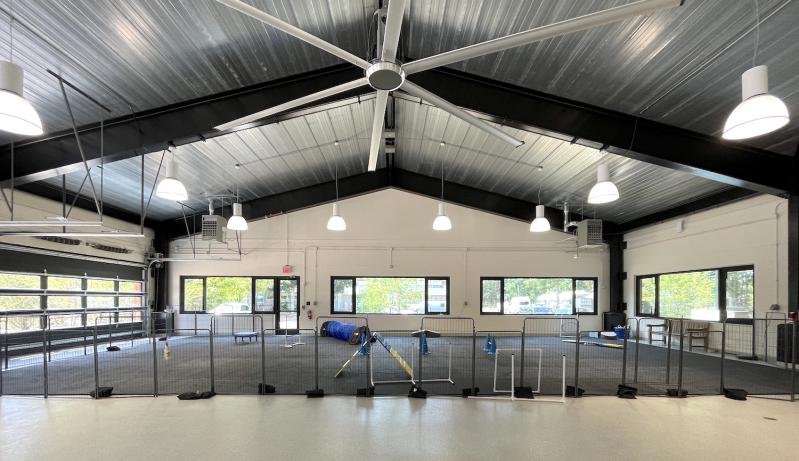
Across the parking lot from the kennel is the William P. Rayner Training Center, which “has been a dream come true for us,” Ms. Berger said. “We basically had a fenced-in yard over here, and training was so popular but was limited because of where we were. But the classes were so important to what the animals need to keep them in their homes.”
The training center is a large white room with black beams stretching across the vast black ceiling. There’s a space dedicated to puppy training with obstacles and an area for classes. Along an entire wall are garage doors that can fully open to allow for an indoor-outdoor experience.
The next round of classes starts at the end of August. They include puppy prekindergarten and kindergarten, agility enrichment, socialization, ARFans social club (for former ARF dogs), and more. A schedule and registration details can be found at arfhamptons.org.
“Puppy training is so instrumental, especially socialization, and the earlier you start off on the right foot, the better,” Ms. Nichols said.
The William P. Rayner Training Center will be the location for ARF’s Bow Wow Meow Ball on Saturday, Aug. 19. Cocktails will be served from 6:30 to 8:00, followed by dinner and dancing. Many ARF animals will also be present. Tickets start at $1,000 and can be reserved at bit.ly/47l2mjZ.
“The gala is essential to us because we are 100 percent funded by contributions. Without community support and events like this, ARF wouldn’t be here,” Ms. Nichols said.
Although ARF has successfully completed its Forever Home, it is still looking for a full-time veterinarian. For the right person, working in shelter medicine is “a dream job, it’s always exciting and never boring,” Ms. Nichols said.
She encourages people to stop by for a visit any day of the week.
Adoptions are done Thursdays through Sundays from 11 a.m. to 4 p.m. It’s suggested that prospective owners look online to see which animals are available and to start the application if one sparks their interest.
There are also plenty of opportunities to volunteer.
“When you see what happens here, it touches your heart,” Ms. Nichols said. “You might find that you fall in love with a cat or a dog. The rescue work that’s done here is heartwarming and it’s essential.

